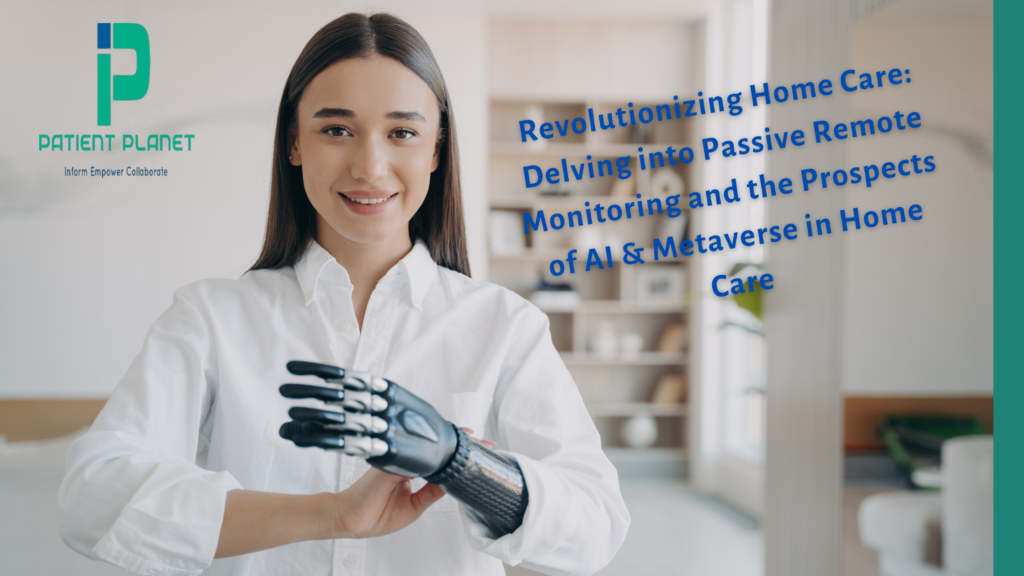Introduction:
In recent years, advancements in technology have ushered in a new era of home care, transforming the way we support and care for individuals in need. Two revolutionary technologies at the forefront of this transformation are Passive Remote Monitoring (PRM) and the promising prospects of Artificial Intelligence (AI) and the Metaverse. In this blog post, we will explore how these cutting-edge technologies are revolutionizing home care, improving patient outcomes, and enhancing the overall caregiving experience. Join us on this exciting journey into the future of home care!
- The Rise of Passive Remote Monitoring (PRM):
Passive Remote Monitoring is an innovative system that utilizes various sensors and smart devices to monitor patients’ health and activities in real-time without requiring their active participation. PRM is particularly beneficial for elderly individuals or those with chronic health conditions who wish to age in place. The system discreetly collects data on vital signs, movement patterns, sleep quality, and more, providing caregivers and healthcare professionals with valuable insights into the patient’s well-being.
The Advantages of PRM in Home Care:
- Enhanced Safety: PRM can detect emergencies such as falls or sudden changes in vital signs, allowing for immediate response and reducing the risk of severe consequences.
- Early Detection of Health Issues: Continuous monitoring enables early detection of health issues, facilitating timely medical interventions and preventing complications.
- Non-Intrusive: PRM respects patients’ privacy and independence as it operates passively in the background without requiring them to wear or interact with any devices actively.
- Cost-Effective: With PRM, patients can avoid frequent hospital visits, leading to potential cost savings and easing the burden on healthcare systems.
- AI in Home Care:
Artificial Intelligence is transforming various industries, and home care is no exception. AI-powered systems can analyze vast amounts of data collected from PRM devices, medical records, and other sources, allowing for personalized and data-driven care plans. AI algorithms can identify patterns, predict health trends, and offer valuable insights to healthcare providers, empowering them to make informed decisions for each patient.
The Benefits of AI in Home Care:
- Personalized Care: AI enables tailored care plans based on individual health data and historical records, leading to more effective and personalized treatment approaches.
- Remote Diagnostics: AI can analyze patient data remotely, facilitating timely diagnoses and reducing the need for in-person visits, particularly in remote or underserved areas.
- Predictive Analytics: AI algorithms can predict potential health issues and risk factors, allowing proactive measures to prevent health deteriorations.
- Caregiver Support: AI tools assist caregivers in managing patients’ daily routines, medication reminders, and provide valuable information and support to ensure efficient care.
- The Metaverse in Home Care:
The Metaverse is a virtual reality-based, shared, and immersive digital space that goes beyond traditional screen-based interactions. In the context of home care, the Metaverse offers exciting possibilities for improving patient engagement, providing virtual support, and facilitating social interactions.
The Potential of the Metaverse in Home Care:
- Virtual Support and Rehabilitation: The Metaverse can facilitate virtual therapy sessions, physical rehabilitation programs, and cognitive exercises, promoting patient engagement and adherence to treatment plans.
- Social Interaction: For isolated or homebound patients, the Metaverse provides opportunities to interact with others, attend virtual events, and participate in support groups, fostering a sense of community and combating loneliness.
- Remote Consultations: Healthcare providers can offer telehealth consultations through the Metaverse, creating a more immersive and engaging patient-doctor interaction.
- Education and Training: The Metaverse can be a valuable tool for training caregivers, medical professionals, and family members in various aspects of home care.
The Integration of PRM, AI, and the Metaverse:
The true power of revolutionizing home care lies in the integration of these cutting-edge technologies. By combining PRM with AI capabilities, healthcare providers can receive real-time data on patients’ health status and trends, allowing for more accurate diagnoses and personalized treatment plans. AI-powered virtual assistants can assist caregivers in managing daily routines, medication reminders, and offer helpful insights for better care coordination.
Moreover, the Metaverse complements these technologies by creating a seamless and immersive virtual environment where patients can participate in therapy sessions, socialize with peers, and attend educational programs from the comfort of their homes. Virtual reality experiences can contribute to patients’ mental well-being, reducing feelings of isolation and enhancing their quality of life.
The Future of Home Care:
As we move forward, the future of home care holds limitless possibilities. Integrating PRM, AI, and the Metaverse can lead to a healthcare ecosystem that prioritizes personalized care, patient empowerment, and improved outcomes.
- Advanced Diagnostics: AI algorithms can analyze vast patient data, including genetic information and lifestyle factors, to provide more accurate and early diagnoses of various health conditions.
- Remote Monitoring: PRM combined with AI can enable continuous monitoring of patients’ health parameters, alerting healthcare providers of any deviations from normal patterns, ensuring timely interventions.
- Personalized Treatment Plans: AI can process individual patient data to create highly personalized treatment plans, considering genetic factors, medication interactions, and lifestyle choices.
- Virtual Reality Therapies: The Metaverse can offer immersive and engaging therapies, such as exposure therapy for phobias or virtual reality games for physical rehabilitation.
- Telemedicine Advancements: The Metaverse can enhance telemedicine experiences, making virtual consultations more interactive and lifelike for both patients and healthcare professionals.
Conclusion:
The integration of Passive Remote Monitoring, Artificial Intelligence, and the Metaverse is revolutionizing home care, providing personalized, data-driven, and patient-centric solutions. As technology continues to evolve, we can expect even more groundbreaking advancements in the field of home care, ultimately leading to improved patient outcomes, better quality of life, and increased caregiver support.
The future of home care is an exciting intersection of cutting-edge technology and compassionate caregiving, where patients can receive exceptional care from the comfort of their own homes. Embracing these technologies will not only transform the way we provide care but also redefine the relationship between

